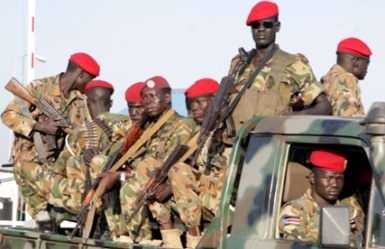S. Sudan finance minister tables $4 billion budget before parliament
July 2, 2014 (JUBA) – South Sudan’s finance minister, Agrey Tisa Sabuni, tabled the 2014-15 annual budget before parliament on Wednesday.

Oil revenue contributes 8.891 billion SSP, while non-oil revenue accounts for 2.650 billion SSP, with 436 million SSP received through donations and loans from the World Bank.
BUDGET EXPENDITURE
The largest expenditure in the budget is the salaries of government employees, including soldiers serving in the national army (SPLA) and other organised forces, accounting for 4.378 billion SSP or 39% of the overall budget. This is followed by the security sector, accounting for 3.13 billion SSP or 35% of the budget.
Meanwhile, fire, police and prison services has been separately allocated 1.573 billion SSP. The sector comprises of 19,000 personnel at central government level and 53,000 at state level.
However, Tisa said he hoped to see changes in the future to the trends in spending.
Just 13% of overall budget spending will be allocated to generating capital.
“This is not how we would wish it (the budget allocation) to be,” he said.
The education sector will receive 622 million SSP for payment of 28,000 teacher salaries, as well as provide support for state and county education departments. This budget also includes funds for universities and teacher training, according the proposal tabled before lawmakers on Wednesday.
The health sector will receive 451 million SSP, jointly provided by the government (397 million) and the World Bank (54 million).
The infrastructure sector has been allocated 393 million SSP, 158 million of which will come from government revenues and 235 million from development partners.
The government will also avail 90 million SSP for what minister described as “support to key priority roads”, with the World Bank to contribute 48 million for the construction of the Kapoeta-Narus section of the Juba-Nadapal road.
Juba airport has been allocated 150 million SSP, supported with a loan from China.
Also included in the government’s annual budget expenditure was the natural resources and rural development sector, to receive 363 million to cater for 16,000 wildlife staff at state level, as well as the salaries of employees in its agriculture and livestock departments, while the public administration will receive 822 million.
GOVERNMENT DEBTS AT 10 BILLION
The humanitarian sector has been allocated 110 million SSP. However, the United Nations estimates that over $1.6 million has already been provided this year. As the funding was not channelled through government agencies it is not included as part of the budget proposal, Tisa said.
The government has also allocated funds to pay its debts, which according to Tisa amounted to 6.590 million at the start of the current financial year, excluding arrears.
“This is a lot of money for a young nation and it excludes money we (the government) owe as a result of contractual arrears,” he said.
“When arrears are taken into account, you can expect our total indebtedness to exceed 10 billion [South Sudanese] pounds,” he added.
Tisa has criticised what he described as financial indiscipline, calling on MPs to intervene by enacting appropriate anti-graft bills.
Parliament will now deliberate on the budget, which is expected to be passed within three weeks.
(ST)
